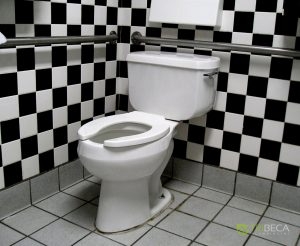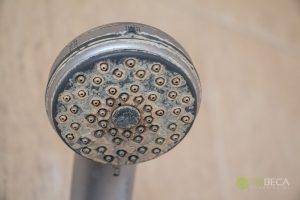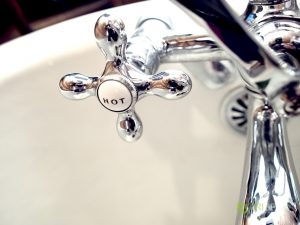You should always be able to count on a toilet flushing properly when you need it to. However, things happen and toilets clog and overflow. Here is what you can do to fix an overflowing toilet:
should always be able to count on a toilet flushing properly when you need it to. However, things happen and toilets clog and overflow. Here is what you can do to fix an overflowing toilet:
Turn Off the Valve
When a toilet is overflowing, the first call to action is to stop the flow of water in the bowl. It doesn’t matter what the cause of the overflow is. The best place to do this is typically at the toilet’s main shutoff valve.
You should be able to see a water line from your bathroom wall to the toilet, as well as a hand-crank valve in the same area. If you don’t see this, the toilet valve might be hidden behind the wall or floor tiles. If this is the case, you might need to talk to a plumber about modifications to gain access. The toilet valve is pretty much the only way to fully stop the flow of water, unless you shut off the main valve to your home.
Check the Flapper
If you are unable to shut the valve off and your toilet is continuing to overflow, then you will need check the inside of the toilet tank.
You will need to check the flapper first. It is typically a hinged rubber disc that covers a hole at the bottom of the tank. If the flapper is open, then close it manually. Closing this should stop the water flow.
Get Things Flowing
When you have prevented the overflow, the final step to unclog the toilet. If you have a toilet plunger, that should be your go-to tool. A plunger with a toilet flange would work best.
For clogs that you just can’t clear, or for any other plumbing emergencies, call Tribeca Plumbing in the DFW Metroplex at (214) 402-5454.


 When you walk by the water heater, do you hear popping, gurgling, or whistling noises? You should never hear odd noises from your water heater, and this is a sure sign of a problem. Often resulting from the water boiling inside the tank or sediment burning, these problems often signal that your water heater is nearing the end of its life. You should drain and clean the tank to remove any sediment or mineral buildup. Also, check the thermostat to be sure it is not set too high.
When you walk by the water heater, do you hear popping, gurgling, or whistling noises? You should never hear odd noises from your water heater, and this is a sure sign of a problem. Often resulting from the water boiling inside the tank or sediment burning, these problems often signal that your water heater is nearing the end of its life. You should drain and clean the tank to remove any sediment or mineral buildup. Also, check the thermostat to be sure it is not set too high.